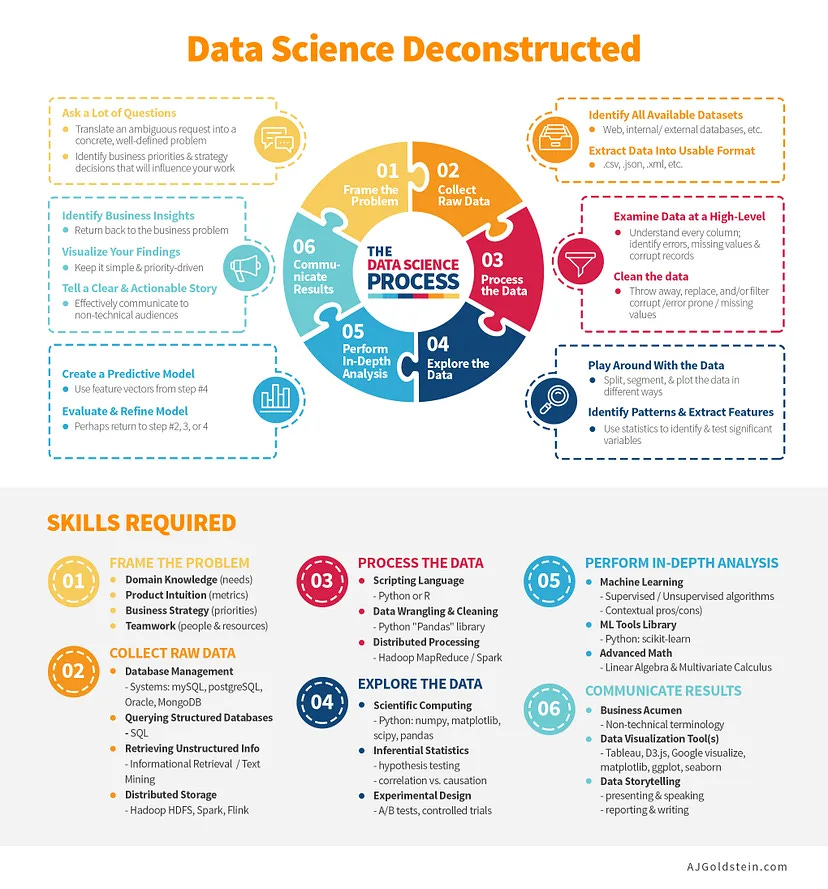Tech Domains Unveiled: Data Science
A Gateway to Data Science: Exploring Skills, Tools, and a minor in Data Science
Data science isn't just a career path; it's a ticket to a world where every data point tells a story waiting to be uncovered. Imagine being the detective of the digital age, unlocking secrets hidden within the vast sea of information. From predicting customer behaviors to revolutionizing healthcare, data science is the ultimate fusion of creativity and analysis. It's not just about numbers; it's about decoding the language of data to unravel solutions to real-world problems. In a world where information is power, data scientists are the wizards wielding the magic wand of analytics, shaping the future one insight at a time.
Common Tasks in Data Engineering:
Data engineers build systems to collect, manage, and transform raw data into usable information. They ensure data accessibility for data scientists and business analysts to interpret and optimize organizational performance. Working with data involves a range of tasks aimed at leveraging information to drive business decisions and operations. This includes acquiring datasets tailored to meet specific business needs and supporting the development of data streaming systems to enable real-time data analysis. Additionally, professionals in this field implement new systems for data analytics and business intelligence, developing algorithms to transform raw data into actionable insights. They are also responsible for building, testing, and maintaining database pipeline architecture to ensure smooth data flow and accessibility. Furthermore, they create new data validation methods and analysis tools to enhance data quality and accuracy while ensuring compliance with data governance and security policies. Overall, these tasks contribute to the effective utilization of data to drive organizational growth and innovation.
Skills Required to get into Data Science:
Statistics and Probability: Essential for analyzing data, building models, and making accurate predictions.
Machine Learning: Knowledge of algorithms for supervised and unsupervised learning, regression, classification, and clustering.
Programming Languages: Proficiency in Python and R for data manipulation, analysis, and model building.
Data Cleaning and Preprocessing: Ability to clean, preprocess, and structure unstructured data for analysis.
Data Visualization: Skills in creating informative and visually appealing graphs, charts, and dashboards.
Deep Learning: Understanding of neural networks for tasks like image recognition and natural language processing.
Experimental Design and Hypothesis Testing: Understanding to validate findings and draw meaningful conclusions from data.
Data Science Tools:
Python Data Science Libraries: Tools like Pandas, NumPy, Scikit-learn, TensorFlow, or PyTorch for data manipulation and modeling.
SQL (Structured Query Language): Proficiency for querying, managing, and analyzing relational databases.
Data Visualization Tools: Platforms like Tableau, Power BI, or Plotly for creating interactive visuals.
Big Data Platforms: Solutions such as Hadoop, Spark, or Google Cloud Platform for distributed computing.
Containerization and Orchestration: Tools like Docker and Kubernetes for deploying and managing workflows.
Cloud Computing Platforms: AWS, Azure, or Google Cloud Platform for scalable resources and services.
Data Wrangling Tools: Software like Trifacta or pandas-profiling for data cleaning and transformation.
How BITS can help?
BITS offers students a minor in data science through which they can learn about the theory of Data Science. The minor comprises five courses, three of which are core courses and two electives. Let us take a look at the courses offered as part of the minor:-
Foundation of Data Science(CS F320): This course is helpful for data science because it covers essential topics such as handling high-dimensional data, big data analytics, probability theory, machine learning algorithms, optimization techniques, time-series analysis, and data visualization. These concepts and skills are fundamental for extracting insights, making predictions, and deriving value from data in various domains, making the course highly relevant and practical for data science practitioners.
Machine learning(BITS F464): This course covers a wide range of machine learning techniques, from basic to advanced, essential for data science. Students learn to identify problems suitable for machine learning, gain insights from data, and apply algorithms for regression, classification, clustering, and reinforcement learning. They explore advanced topics like deep learning and apply machine learning to real-world examples such as speech recognition and image retrieval. The course also addresses challenges posed by big data, preparing students to use machine learning effectively in data-intensive scenarios.
Applied Statistical Methods(Math F432): The course helps you become proficient in factor analysis, distribution-free methods, time series forecasting, and statistical quality control (SQC) procedures, which are essential for mastering various aspects of data analysis.
Other Elective Courses: In addition to the core courses, students can choose from a variety of elective courses to tailor their learning experience and further enhance their expertise in data science. Electives such as Deep Learning(CS F425), Data Mining(CS F415), natural language processing(CS F429), and others offer specialized knowledge and skills relevant to specific areas within the field of data science.





